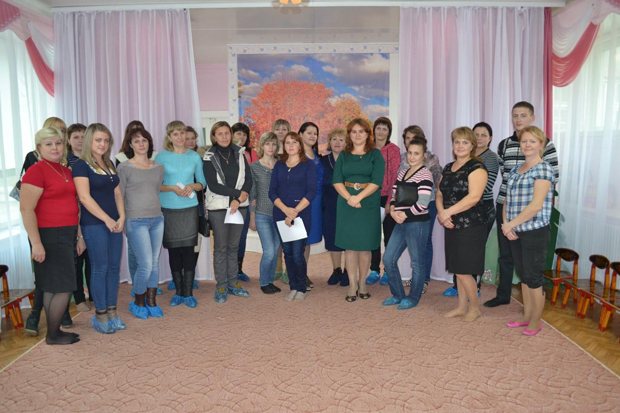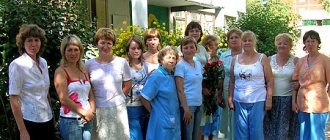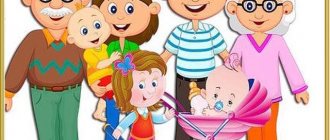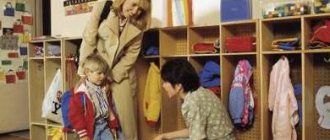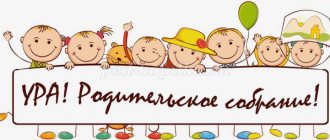Parent meeting in a non-traditional form in kindergarten
Leading:
We listened to the teacher, got acquainted with the principles, remembering which, you will learn to communicate correctly with your child. Now let's give the floor to the parents.
***Exercise “Family Commandments”
Parents make a small list of family commandments, customs, rules, prohibitions, habits, attitudes, views that all family members adhere to. Everyone reads out this list. This exercise allows you to compare your ideas about family life and upbringing with the ideas of others. Question for analysis: “Which commandments satisfy you and which do not?”
Leading:
And now we have a “cafe break”. Music directors will play with you. Musical game "Merry Round Dance".
***Exercise “Finish the sentence” (or “Spicy dish”).
The teacher begins the sentence and passes the baton to any parent who continues it. The exercise provides an opportunity to share with each other the experience of raising a child.
“Communication with a child is...” “Parents, through dialogue with the child, make him feel...” “My love for the child is...” “When strangers make comments to my child...” “If I see that my 4-year-old son is being “beaten.” “peer... “When a child makes me angry, I -...” “When my child behaves badly at the table...” “I start a conversation with the child about his bad deed...” “I forgive my child very quickly, because...” “If the child has done something wrong...” “The husband unfairly punished the child, I -...” “In our family, we have “punishment-reward” -...”
(if you find it difficult to continue, break the statement into parts).
Presenter: Station “Our Children”.
We will watch a video of your children and find out what they think about parenting issues.
1.
Video “Through the Mouth of a Child” (your children were asked the same tricky question “Are you raised at home? How?” The children’s answers, of course, will make you laugh...
2.
Presentation “Message to parents from a child.”
Host: “Cafe break” with physical education instructor M.V.
Kurbatova. Physical exercise "Journey to the forest." The train is leaving
Presenter:
As we see from the video, some children associate the word “education” with the word “punishment.” Think about this, dear parents...
And we are approaching the “Punishment and Reward” station
, where we are met by an educational psychologist
Dear parents! I'll start with the questionnaires (analyzes).
Raising a child is a complex pedagogical process and it is not possible without punishment and encouragement. How do parents punish their children? Your answers: - put in a corner; - deprived of pleasures, such as going to the store for shopping or visiting; - limit watching animated films and playing games on the computer; - change the intonation of the voice, facial expression; - discuss the offense, have a heart-to-heart talk. Indeed, these are acceptable methods of punishment. It should be remembered that corporal punishment, ignoring a child for a long time, deprivation of love and affection are not allowed. The action, the undesirable act, is condemned and punished, not the child’s personality. What is punishment? Punishment is not at all the action of the punisher, but what happens in the soul of the child being punished, what he experiences at the same time. From a psychological point of view, this is a well-known unpleasant, oppressive feeling of shame and humiliation, which you want to get rid of as quickly as possible and never worry about again. Without this feeling, punishment is just an open act of violence. It is not educational. Punishment has a triple meaning: the child must understand, realize his action, correct himself and not do it again. How are things going with incentives? They are more effective as an educational tool. If punishment only stops bad actions, then encouragement focuses on good ones and reinforces them. The best reward for a child is the knowledge that he brought joy to his loved ones, and a gift in addition only symbolizes this. From the parents' answers it follows that they generally do not experience any particular difficulties in raising their child. Some parents note that their children are sometimes disobedient, stubborn, and restless. At preschool age, children's voluntary behavior is not yet sufficiently developed. They are impulsive and restless. With the right educational influence, these shortcomings are corrected with age. The main thing, as already said today, is to accept your child for who he is, understand and love him.
Non-traditional parent meeting “One day in the life of a modern kindergarten”
Marina Buravikhina
Non-traditional parent meeting “One day in the life of a modern kindergarten”
Full name of the author of the work: Buravikhina Marina
Municipal autonomous preschool educational institution kindergarten "Skazka"
, With. Rzhanitsa
Area: working with parents
Goal: to show in practice the importance of teaching and raising preschool children.
Tasks:
1. Create a relaxed, comfortable environment.
2. Involve parents in active work .
3. Expand the knowledge and ideas of parents about the image of a modern child and his parents .
4. Increase the level of cooperation between kindergarten and parents .
5. Increase the level of pedagogical culture of parents .
Abstract: a general parent meeting in a non-traditional form is designed for parents of children attending preschool educational institutions from 1.5 to 8 years old. During the meeting, parents are not only listeners, but also active participants. During the event, a discussion is held about modern children , modern parents and provides the opportunity to see one day in the life of a kindergarten . The parent meeting is accompanied by children's performances, presentations, and a video.
*The material can be used by teachers in working with parents of any age group, at any period of the school year (beginning of the school year: introduction to the educational process, end of the school year: summing up, progress report). Practical activities can be replaced, supplemented, expanded.
(Registration of parents is accompanied by a musical presentation “Our favorite kindergarten "
).
— Hello, dear parents , it’s very nice to see you in this bright and cozy room. I hope that our meeting will give you the opportunity to relax, take something new for yourself and be happy for your children! Before starting our event, I suggest you close your eyes and imagine your child for a second: “What is he like?”
,
“Would you like him to be different, or maybe the same as everyone else?”
. Have you thought about it? I am sure that each of you has decided that your child is the best, the dearest, the most, the most... and it will always be so! After all, any child is a unique, unique world - he is a person with his own point of view, his own unique abilities, and the task of adults is to find the time and desire to learn to understand this! the world, help it grow up, preserving and protecting this uniqueness.
-Time does not stand still, the world is changing, becoming modern , and the concept of “ modern children ”
.
We often say: children today are not the same as they were before. So what are they like today's children ? Please think! Answer this question ( parents' )
parents' responses :
Modern children they:
• Smart, persistent, demanding, independent, sociable;
• informed and erudite;
• Aware of the world around them, because they live in an era of information boom;
• Very mobile and hyperactive;
• They depend on technology and cannot imagine their life without gadgets and computers;
• They do not have heroes and idols;
• They do not hear instructions and orders;
• Often violate generally accepted rules and prohibitions.
• They do not tolerate violence.
• Any persuasion or methods of persuasion have no effect on them.
It’s just that modern children have a modern childhood !
The life of a child in the 21st century has changed very much and is closely related to the capabilities of parents . From an early age, a child is surrounded by television, radio, cinema, computer games, the Internet, he can master a mobile phone, computer, television faster than an adult, learns how to handle them, but often acquires restlessness, unstable attention, and the inability to concentrate on one thing for a long time. business. Modern children can simultaneously listen to a fairy tale and draw or assemble a construction set, but are sometimes unable to sit still during a conversation.
— The child listens to and watches the same songs and TV shows his parents goes with his family to cafes and restaurants, goes abroad on vacation, travels; knowledgeable about car brands and advertising. However, thanks to modern educational and computer technologies, the child’s psyche becomes unstable. day he is faced with such huge flows of information that not every organism can withstand it. [3]
Modern children are neither difficult nor easy. They are ordinary children who, like a hundred years ago, still need the warmth and care of their parents . Modern parents !
-What can we say about modern parents , who are they? [3] Despite the fact that there is a digital generation gap, modern parents are also becoming different. The emergence of new technologies has led us to the fact that parents in many ways cannot convey their life experience to their child . Who is the modern parent ? The one who raises children in a modern . Taking information about raising children most often from the Internet, and absorbing it from completely contradictory sources, mothers and fathers, even before the baby is born, try to write something like a script for his future life . And, of course, the best scenario is how to raise a genius.
— Modern parents want their children to grow up as bright, creative individuals, able to make independent decisions and overcome difficulties that arise. However, the modern parent deprives the child of independence. It must be remembered that there is no need to do for the child what he can do himself. If a child has already learned, for example, to eat or dress without the help of an adult, then give him the opportunity to do it on his own! The desire for independence must be encouraged in every possible way, and not discouraged. Very often , parents react to their child’s inept attempts to do something on their own like this: “Don’t interfere!”, “Move away,” “You’re still small, you can’t handle it, I’ll do it myself. ”
I’ll do everything,” etc. Of course, you can dress the child faster than he can do it himself, or feed him without dirtying his clothes and everything around him, but then you will interfere with the child’s increasing independence. [3]
— Parents strive to send their children to state kindergartens , where they will receive guaranteed preschool education in accordance with modern standards . Many modern families are waiting for “pumping up”
their children with knowledge, skills, and various competencies so that their child can be competitive when entering school, university, or a prestigious job.
The fact that parents are looking for better options for the development and upbringing of their children is, of course, nothing new. The novelty is that they are afraid of choosing the wrong path for their child’s development. As soon as a child enters a preschool institution, parental in the upbringing and development of the child is limited. They have the opinion that in kindergarten they will teach and teach him everything.
— A kindergarten is a child’s second family, in which he lives a safe and interesting life. Modern children are happy to go to kindergarten , they love it!
— Preschool age is an important stage in a child’s life , when quality acquisitions occur in all areas of the child’s development. Based on children's curiosity, an interest in learning will develop. The cognitive abilities and activity of a preschooler will become the fundamental basis for the formation of theoretical thinking. The ability to communicate with adults and peers will allow you to move on to educational cooperation.
— Throughout the children’s entire stay in the preschool, we are teachers nearby. We watch children grow, help each other, cooperate and be friends, learn from each other, celebrate holidays, participate in competitions, rejoice at the children’s achievements and experience failures together. Each of our children is special, each has their own talents and abilities. Today we will show you how our days go.
Poem, song “
Kindergarten ” (school preparatory group)
Every day , except weekends, our kindergarten is waiting for its students. The morning begins in the locker room, where our guys show their independence. As a rule, it is not every morning that children get up cheerful and in a good mood. Some of them did not get enough sleep and therefore are capricious, others do not want to part with their mother. And the teacher’s task is to calm his pupil. As a rule, this does not take much time. Children very quickly become charged with a good mood and take on their daily activities with enthusiasm.
- What do you think these things are? ( parents' )
Morning exercises are an essential necessity for a child's body . In addition, gymnastics allows you to wake up 100%, gives you a boost of vivacity and energy for the whole day and lifts your spirits, turning into a real theatrical performance.
“Do exercises”
(flash mob with children)
- One of the important factors that improves health is nutrition. Proper nutrition is the foundation of health and longevity, so it is very important to follow the rules of rational nutrition at all age periods of a person’s life .
— During their stay in kindergarten , children learn to set tables, be on duty, improve correct and safe behavior at the table, in a word, they master the food culture as a whole.
Presentation “Healthy Eating”
(photo of children
“Duty”
,
“Serving”
,
“Eating”
)
— As you know, the tasks of a kindergarten include not only supervision and care, but also educational activities with children, the goal of which is the comprehensive development of both physical and mental abilities of preschoolers.
— One of the target points at the stage of completing preschool education is speech development. With the help of speech, a child can express his thoughts and desires, and he develops the prerequisites for literacy.
(Speech development game “Literacy”
) – preparatory group
— Preschoolers are born researchers, and this is confirmed by their curiosity, constant desire to experiment, and desire to comprehend the path of knowledge. Cognitive activity contributes to the formation of elementary mathematical concepts. These are shape, color, size, quantity, number, movement and rest, space and time, cause and effect...
(Math game)
- senior group.
— What other educational activities are carried out in kindergarten , what classes do your children take? Do you know, remember? ( parents' )
- That's right, this is drawing, modeling, appliqué, getting to know your surroundings, music, physical education.
Musical activities include listening, singing, songwriting, musical and rhythmic movements, musical play and dance creativity, as well as playing children's musical instruments. From a young age, children begin to play with rattles, wooden spoons, pipes, and metallophones. We observe all the children’s achievements at holidays, entertainment, and theme nights.
Presentation “Our Holidays”
— Motor activity is a natural need for movement, the satisfaction of which is the most important condition for comprehensive development and education. An important place in the motor mode is occupied by outdoor games, holidays, entertainment, and physical education.
Presentation “Fizkulthello!”
— Hard work is one of the most important moral qualities of a person. The work activity of preschool children is characterized by an interest in the process of action itself. In the process of work, children practically learn the properties of the things around them, observe the growth and changes of plants, examine animals, getting acquainted with their living conditions, etc. They compare, contrast, and strive to independently find the answer to endless “whys.” They develop curiosity and educational interests. Labor strengthens children physically, since they perform many types of work outdoors (watering a flower garden, garden bed, fetching water, shoveling snow, etc.)
. Children become capable of exerting their strength and overcoming difficulties. In the process of work, issues of aesthetic education of children are carried out - the ability to see the beauty of the surrounding nature, the beauty of creations created by human hands, the ability to notice and eliminate shortcomings in the environment and strive to create something beautiful.
Dance "Wash"
- middle group
— Children grow up very quickly. And now your child, yesterday’s baby, has already grown up and will soon go to school.
Now the main thing in his life is study . In everyday life, school readiness is often understood primarily as the ability to read and count. This belief is fundamentally wrong. The main thing is that the child has motivation for learning, knowledge and creativity. It is more important to develop memory, attention, thinking, imagination.
All this develops in the game. Often modern children do not know how to play. The family does not give the game the importance it deserves. Parents consider it a waste of time.
The child is praised for writing a letter, for reading a word, and almost never for playing.
Play activity is the basis of the mental development of a preschooler. In play, a child learns about the world around him, his thinking, speech, feelings, will develop, relationships with peers are formed, and self-esteem and self-awareness are formed. The game creates arbitrariness of behavior.
Dear parents , give your children the opportunity to “finish the game”
so that their studies at school become successful and bring them joy.
(Outdoor game with modules)
– junior group
Presentation "This is How We Play"
- From morning until evening the garden is noisy and fun. Games, activities, entertainment, exhibitions, competitions fill our lives . We never get bored.
— A child is a planet that develops according to its own internal laws and principles. An adult plays an important role in the development and maturation of every child, bearing responsibility to him. Parents are the first teachers, whether they are modern or not . Without you, dear parents , the pedagogical process cannot be called complete; the status of the institution largely depends on your participation! This is your understanding, participation in kindergarten , holidays, exhibitions, competitions, projects, repairs.
— At the very beginning of our meeting we talked about modern children , but the concept of happy children is important.
Happiness is when a dream comes true, when you get what you want most in the world, when you achieve what you have been striving for for a long time and persistently.
Happiness is limited and fleeting, because in life there are always new dreams, new desires and new goals.
Unfortunately, most often parents and children have slightly different ideas about happiness. Parents sometimes believe that if a child is fed and well dressed, then he is happy. In fact, it is not so easy to determine whether a child is happy or not, and what is needed for this.
Video “What is happiness”
(children’s answers)
Dear parents ! So our meeting has come to an end. I would like to hear your impressions and wishes! ( parents' , questions)
I wish you and your children health, good luck and patience! Be happy!
See you again!
Bibliography:
1. Federal state educational standard for preschool education.
2. Basic general education program of preschool education “From birth to school”
edited by N. E. Veraksy, T. S. Komarova, M. A. Vasilyeva, 2016.
2. Work program of the music director of the Moscow kindergarten “Fairy Tale”
.
3. A. I. Barkan. Modern parents . What are they?
Synopsis of a non-traditional parent meeting at the preschool educational institution “Physical Education of Children”
Publications on the topic:
Photo report on holding a non-traditional parent meeting Photo report on holding a non-traditional parent meeting on the topic “Interaction between parents and children through theatrical activities.”
Summary of a non-traditional parent meeting "My family - what could be more expensive" Note of a non-traditional parent meeting in the form of an evening - meeting "My family - what could be more expensive" senior group Educator:.
Summary of the non-traditional parent meeting “Learning to play together” Purpose: To generalize and consolidate parents’ ideas about children’s play as a leading activity in preschool age. Form relationships.
Summary of a non-traditional parent meeting in a junior group in the form of a game workshop “Journey to the Land of Sensorics” Goal: enriching parental ideas about the sensory development of children of primary preschool age. Objectives: to familiarize parents with didactic.
Notes on holding a non-traditional parent meeting in the second junior group Notes on holding a non-traditional parent meeting in the second junior group. Educator: - Hello, dear parents. We have.
Summary of the parent meeting in the junior group. Topic: “Cultivating independence in children of primary preschool age” Summary of the parent meeting in the junior group Topic: “Cultivating independence in children of primary preschool age” Parental.
Summary of the non-traditional parent meeting “Round table “Theater activities in kindergarten and at home” Municipal budgetary preschool educational institution “Kindergarten No. 51” Minutes No. 5 Non-traditional parent meeting - round.
Scenario for a non-traditional parent meeting in the form of KVN “Nature Experts” Topic: “Nature Experts”. Goal: to create conditions for cooperation between parents and children, their emotional and mental rapprochement; increase.
Summary of a non-traditional parent meeting in the second junior group on Lego-construction “Lego World” Non-traditional parent meeting in the second junior group on Lego-construction “Lego World” Sabenina Olga Nikolaevna Educator,.
“What do I know about my child?” Summary of a non-traditional parent meeting in the second group of early childhood Municipal budgetary preschool educational institution Kindergarten No. 3 Non-traditional parent meeting in the second group of early age.
Summary of the parent meeting “The role of the family in raising a preschooler”
Municipal budgetary preschool educational institution "Kindergarten of general developmental type No. 76" in the city of Bratsk.
Summary of the parent meeting in the senior group "Prostokvashino"
Topic: “The role of the family in raising a preschooler” (round table meeting)
Compiled by: teacher of MBDOU “DSOV No. 76” Sazonchik Irina Vladimirovna.
Format: round table meeting
Goal: to combine the efforts of families and kindergartens in solving problems related to the upbringing and development of preschool children.
Progress: Good evening, dear parents. Our meeting today is dedicated to the role of the family in raising a child.
For the harmonious development of his personality, every child needs to grow up in a family environment, in an atmosphere of happiness, love, and understanding. In an atmosphere of recognized parental authority, which is taken for granted by the child. It is very important not to lose absolute trust on the part of the child. And for this, parents must take their words and actions seriously, and not allow words to diverge from deeds. It is important to create an emotionally positive atmosphere in the family. Maintain pedagogical tact in relationships with children.
Spiritual communication with children is one of the conditions for maintaining the authority of parents. At the same time, it is important to have joint activities, games, and to introduce the child to the useful and exciting hobbies of the father and mother.
Traditionally, the main institution of education is the family. What a child acquires in the family during childhood, he retains throughout his entire subsequent life. Neither a kindergarten, nor a school, nor any other educational institution will give as much to a child as a family, because he spends most of his life in the family.
The family can act as both a positive and negative factor in education. The positive factor is that no one except the closest and dearest loves the child more. But a family can also harm a child if they use the wrong parenting methods.
Four tactics of upbringing in the family can be distinguished: dictate, guardianship, “non-interference” and cooperation.
- Diktat in the family is manifested in the manifestation of initiative by some family members (mostly adults) and the suppression of the desires and initiative of others.
- Family care is when parents try in every possible way to protect their child from various difficulties, problems and try to satisfy all his needs.
- Cooperation as a type of relationship in a family involves joint activities and spending time.
- With the “non-interference” tactic, parents do not delve into the child’s problems, giving him the opportunity to solve his problems himself. There are 3 styles of family education: - democratic; — authoritarian; - conniving. The democratic style is a style of “consent”; authoritarian style - style of “suppression”; permissive style - the child is left to his own devices.
What is family?
Now let’s think a little - what is a family? (parents' statements). A more complete definition of family is given by N.V. Soloviev: “A family is a small social group of society, the most important form of organizing personal life, based on marital union and family ties, i.e. relationships between husband and wife, parents and children, brothers and sisters and other relatives living together and maintaining a common household.”
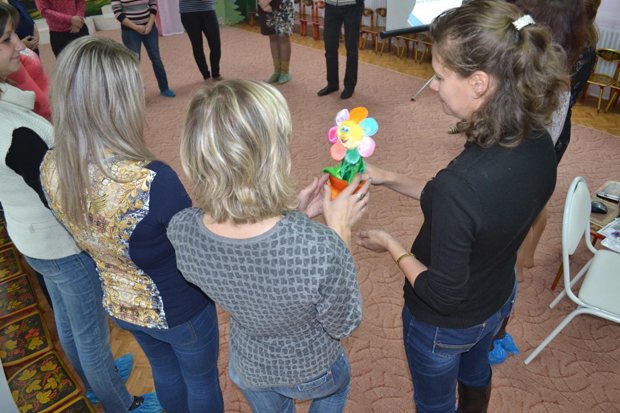
Here's what your children think. (Listening to an audio recording with children’s statements on the topic: “What is a family”) The life of a family is associated with the performance of the following functions:
- Educational function is considered the main function of the family, which is expressed in satisfying the needs of fatherhood and motherhood, and in raising children. — How do you perform this function? (parents' answers)
- Economic function - is expressed in the fact that the joint efforts of spouses make it easier to withstand material adversity, run a joint household and provide family members with food, housing and clothing, etc.
- The emotional function is realized in the satisfaction of family members in sympathy, respect, recognition, emotional support in grief and joy, in psychological protection.
- The family also performs the function of primary social control. - What it is? This is the control of parents over the behavior of children and teaching them the rules of behavior in society, fulfilling social norms, teaching them human dignity. — How do you implement this function in your family? (parents' answers)
- The function of spiritual communication is manifested in joint leisure activities, mutual spiritual enrichment and plays an important role in the spiritual development of society. — How do you spend your leisure time? (parents' speech) - what games do you play with your whole family? (parents' answers).
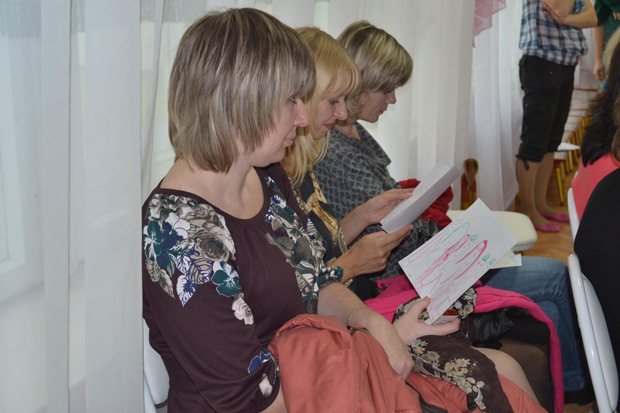
I suggest you now play a little “Association”.
So, all that is needed for this is to start a heart in a circle, to the music, on whom the music stops, he answers the question, and try to answer the first images associated with it that came to your mind. - If a family is a building, then it... - If a family is a color, then it... - If a family is music, then it... - If a family is a geometric figure, then it... - If a family is the title of a film, then she... - If family is a mood, then it... -If family is a country, then it is called -If family is a fruit, then it is... -If family is a famous literary character, then it is.... -If family is an animal, then it is...
Educator: During this exercise, we saw that everyone has their own associations associated with such a concept as Family! Everyone has their own vision and idea of the family. This suggests that we are all different and unique in our associations and perceptions. And this is healthy and quite natural. The floor is given to psychologist Natalya Nikolaevna Tatarnikova.
Our kindergarten is also a kind of big family. And we have a lot of interesting things going on. One of the areas of our work is musical activity. Our children have prepared a dance for you, dear parents. Thank you very much, dear parents, for the work done. I invite you to leave feedback about our meeting.
